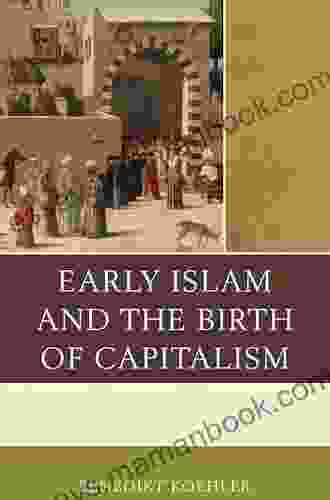Early Islam and the Birth of Capitalism: A Comprehensive Exploration and Analysis

The dawn of Islam in the Arabian Peninsula during the 7th century marked not only a spiritual and religious transformation but also laid the groundwork for significant economic and social changes that would ultimately shape the course of global history. By fostering an environment conducive to trade, innovation, and the accumulation of wealth, early Islam sowed the seeds for the development of capitalist principles that would come to define modern economic systems.
The Economic Landscape of Pre-Islamic Arabia
Prior to the advent of Islam, the Arabian Peninsula was characterized by a largely nomadic society, with a subsistence-based economy primarily centered around herding, agriculture, and trade. Tribal structures governed social and economic relations, with limited central authority or legal frameworks to regulate economic activity.
4.3 out of 5
| Language | : | English |
| File size | : | 1472 KB |
| Text-to-Speech | : | Enabled |
| Enhanced typesetting | : | Enabled |
| Word Wise | : | Enabled |
| Print length | : | 239 pages |
| Screen Reader | : | Supported |
The absence of a centralized monetary system and a fragmented political landscape hindered the development of sophisticated economic practices. However, the strategic location of Arabia along trade routes between the East and West facilitated the flow of goods and ideas, exposing the region to external economic influences.
The Rise of Islam and the Economic Transformation
The advent of Islam introduced a profound ideological and social shift that had far-reaching implications for the economic landscape of Arabia. The Quran, the holy book of Islam, enshrined principles of justice, equality, and the importance of economic activity for the wellbeing of society.
The Prophet Muhammad himself was a merchant and actively encouraged trade and commerce, recognizing their vital role in economic prosperity. He established guidelines for fair trade practices, promoted the use of contracts, and encouraged the accumulation of wealth through legitimate means.
The Expansion of the Muslim Empire and the Spread of Economic Ideas
The rapid expansion of the Muslim empire under the Rashidun and Umayyad caliphates brought new territories and diverse economic systems under Islamic influence. The encounter with advanced civilizations, such as the Byzantines and Persians, exposed Muslims to sophisticated economic practices, including coinage, banking, and taxation systems.
Muslim scholars and traders played a pivotal role in disseminating these economic ideas throughout the empire. They translated ancient Greek and Roman texts on economics and finance, contributing to the development of Islamic economic thought and jurisprudence.
Key Principles of Early Islamic Economics
The economic principles and practices that emerged during early Islam laid the groundwork for the development of capitalism:
1. Private Property and Individualism:
Islam recognized the sanctity of private property and encouraged individuals to acquire and manage wealth. The emphasis on individual responsibility and self-reliance fostered a culture of economic independence and innovation.
2. Market Economy and Free Enterprise:
Early Islam promoted a free market economy, where individuals were generally free to engage in economic activities without undue government interference. The Quran condemned hoarding and price gouging, emphasizing the importance of fair competition and transparency.
3. Contractual Obligations and the Rule of Law:
The sanctity of contracts and the establishment of a comprehensive legal framework provided stability and predictability to economic transactions. The Quran and the teachings of the Prophet Muhammad stressed the importance of fulfilling contractual obligations and upholding the rule of law.
4. Limited Government Intervention:
While the early Islamic state played a role in regulating economic activity, it generally adopted a laissez-faire approach, allowing individuals and markets to operate relatively freely. This limited government intervention fostered an environment conducive to economic growth and innovation.
5. The Importance of Trade and Commerce:
Islam placed great emphasis on trade and commerce as legitimate and noble professions. The Prophet Muhammad himself was a merchant, and the Quran encourages Muslims to engage in lawful trade to earn a livelihood.
6. The Prohibition of Usury (Riba):
One of the key distinguishing features of Islamic economics is the prohibition of usury or interest charges on loans. This prohibition discouraged excessive credit and speculation, fostering a more stable and equitable economic environment.
The Impact of Early Islam on the Development of Capitalism
The economic principles and practices nurtured by early Islam had a profound impact on the development of capitalism in later centuries. These ideas spread beyond the Muslim world through trade, conquest, and intellectual exchange, influencing the economic thought and institutions of Europe and beyond:
1. The Rise of Merchant Capitalism in Europe:
Muslim merchants played a significant role in introducing new trade practices and technologies to Europe during the Middle Ages. The establishment of trade routes between the Muslim world and Europe facilitated the exchange of goods, ideas, and economic innovations.
2. The Development of Banking and Finance:
The Islamic prohibition of usury led to the development of alternative financial instruments, such as profit-sharing and joint ventures. These practices paved the way for the emergence of banking and finance systems in Europe.
3. The Reformation and the Spirit of Capitalism:
The Protestant Reformation in Europe in the 16th century drew inspiration from Islamic economic principles, emphasizing the importance of individual responsibility, hard work, and economic success as signs of God's favor. This Protestant ethic became a driving force behind the rise of capitalism in Europe.
The connection between early Islam and the birth of capitalism is a captivating and complex subject that has shaped the course of global economic history. The principles of private property, free enterprise, contractual obligations, and the importance of trade fostered by early Islam created an environment conducive to economic growth, innovation, and the accumulation of wealth.
The spread of these economic ideas beyond the Muslim world through trade, conquest, and intellectual exchange played a pivotal role in the development of capitalism in Europe and beyond, leaving a lasting legacy on modern economic systems. Understanding the early Islamic roots of capitalism provides valuable insights into the historical evolution of economic thought and the enduring principles that continue to shape the global economy today.
4.3 out of 5
| Language | : | English |
| File size | : | 1472 KB |
| Text-to-Speech | : | Enabled |
| Enhanced typesetting | : | Enabled |
| Word Wise | : | Enabled |
| Print length | : | 239 pages |
| Screen Reader | : | Supported |
Do you want to contribute by writing guest posts on this blog?
Please contact us and send us a resume of previous articles that you have written.
 Top Book
Top Book Novel
Novel Fiction
Fiction Nonfiction
Nonfiction Literature
Literature Paperback
Paperback Hardcover
Hardcover E-book
E-book Audiobook
Audiobook Bestseller
Bestseller Classic
Classic Mystery
Mystery Thriller
Thriller Romance
Romance Fantasy
Fantasy Science Fiction
Science Fiction Biography
Biography Memoir
Memoir Autobiography
Autobiography Poetry
Poetry Drama
Drama Historical Fiction
Historical Fiction Self-help
Self-help Young Adult
Young Adult Childrens Books
Childrens Books Graphic Novel
Graphic Novel Anthology
Anthology Series
Series Encyclopedia
Encyclopedia Reference
Reference Guidebook
Guidebook Textbook
Textbook Workbook
Workbook Journal
Journal Diary
Diary Manuscript
Manuscript Folio
Folio Pulp Fiction
Pulp Fiction Short Stories
Short Stories Fairy Tales
Fairy Tales Fables
Fables Mythology
Mythology Philosophy
Philosophy Religion
Religion Spirituality
Spirituality Essays
Essays Critique
Critique Commentary
Commentary Glossary
Glossary Bibliography
Bibliography Index
Index Table of Contents
Table of Contents Preface
Preface Introduction
Introduction Foreword
Foreword Afterword
Afterword Appendices
Appendices Annotations
Annotations Footnotes
Footnotes Epilogue
Epilogue Prologue
Prologue Martin Mcdonagh
Martin Mcdonagh Marion Gleason Mcdougall
Marion Gleason Mcdougall Brian Fried
Brian Fried J T Bleu
J T Bleu Frank Watson
Frank Watson James O Brien
James O Brien Ronald Eugene Isetti
Ronald Eugene Isetti Georges Bizet
Georges Bizet Vironika Wilde
Vironika Wilde Jennifer L Green
Jennifer L Green David Edgar
David Edgar Robyn Wideman
Robyn Wideman Samuel P King
Samuel P King Suet Fan Regina Wong
Suet Fan Regina Wong Cathy O Brien
Cathy O Brien Anu Lal
Anu Lal Donald Revell
Donald Revell Rabindranath Tagore
Rabindranath Tagore Shelly Tochluk
Shelly Tochluk Alexander I Bobenko
Alexander I Bobenko
Light bulbAdvertise smarter! Our strategic ad space ensures maximum exposure. Reserve your spot today!

 Larry ReedDelving into Mike Bartlett's Two Modern Masterpieces: "Love, Love, Love" and...
Larry ReedDelving into Mike Bartlett's Two Modern Masterpieces: "Love, Love, Love" and... Cooper BellFollow ·2.9k
Cooper BellFollow ·2.9k Dominic SimmonsFollow ·19.8k
Dominic SimmonsFollow ·19.8k Mark TwainFollow ·12.4k
Mark TwainFollow ·12.4k Samuel BeckettFollow ·8.6k
Samuel BeckettFollow ·8.6k Octavio PazFollow ·7k
Octavio PazFollow ·7k Oscar BellFollow ·18.5k
Oscar BellFollow ·18.5k W.B. YeatsFollow ·19.8k
W.B. YeatsFollow ·19.8k Harrison BlairFollow ·13.4k
Harrison BlairFollow ·13.4k

 Dean Butler
Dean ButlerBlack Widow 2024: A Comprehensive Guide to Kelly...
In 2024, Marvel...

 Gage Hayes
Gage HayesNothing and the Speck: An In-Depth Analysis of Yana...
Yana Toboso's works, particularly the manga...

 Stan Ward
Stan WardThe Best American Poetry 1997: James Tate
The Best American Poetry...

 Corey Green
Corey GreenThe Chance of Home: Exploring the Poetic Landscape of...
Immerse yourself in the evocative world of...
4.3 out of 5
| Language | : | English |
| File size | : | 1472 KB |
| Text-to-Speech | : | Enabled |
| Enhanced typesetting | : | Enabled |
| Word Wise | : | Enabled |
| Print length | : | 239 pages |
| Screen Reader | : | Supported |














